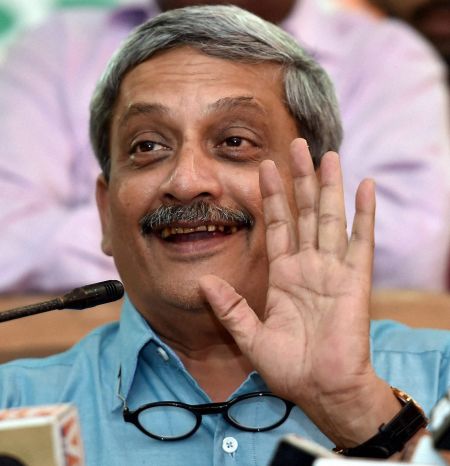SN Misra
Unlike his predecessors, who wore politics on their sleeves, Manohar Parrikar was more like a civil servant. This is not surprising as he was an IIT-ian; these premier institutions have gifted the country many civil servants who joined the portals of South Block. After the Bofors scandal, the unwritten script has been to have a squeaky clean defence minister. AK Antony fit the bill to a T but floundered as he was obsessed with a clean image. Parrikar was different. He combined personal integrity with exceptional intelligence.
At the first meeting he had with the Service Chiefs and top civilian offices, he was quick on the uptake and had no hesitation to speak his mind on issues such as the tardy progress in several DRDO projects. He made “Make-in-India” his flagship concern and asked Dhirendra Singh, who was earlier DG (Acquisition), to give his recommendation to bolster private sector involvement and give a fillip to Make in India initiative in defence production.
Parrikar was keen that the private sector players should be allowed to utilise the huge infrastructure and test facilities built by the DRDO in their 50 laboratories. He also supported liberal funding to the MSMEs from the newly created Technology Development Fund. He promoted the idea that the MSMEs should play a major part in discharging the offset commitment and availing multipliers in critical technology.
Parrikar was also a votary of probity and trust. In the foreword to DPP 2016, he wrote: “The stakeholders must not lose sight of two aspects; probity and trust, and at the same time ensure that the best class of weapons and equipment are made available at the most competitive price”. It is indeed ironical that reasonability of price has become a bone of contention in the ‘Rafale’ deal.
His sangfroid often camouflaged the astute politician in him. It is rumored that he kept files on every politician of his state Goa. His health minister Vishwajit P Rane apparently tweeted that he carried important Rafale files with him to Goa, when he left the Defence Ministry in 2017 owing to ill health. He could be controversial as well. He said in 2009 that veteran BJP leader LK Advani should retire “as pickle when kept too long becomes rancid”. This remark apparently cost him the post of party President, which went to Nitin Gadkari instead. But he was unfazed by this development.
He was most down to earth, unassuming, with no airs of being an IIT-ian. He was unfailing in his courtesy and had concern even for his political adversaries.
He was of the view that India should do a rethink on ‘no first use of nuclear weapon’. Lt Gen DS Hooda, who was Northern Army Commander when the surgical strike post Uri happened, writes that Parrikar was very sharp and quick in decision making. He was like George Fernandes who preferred to discuss with soldiers and have a cup of tea with them than be confined to discussion with the top military leadership only.
A workaholic and a hard taskmaster, he put the Goa model of development on the national map. Politicians are known to be wily; but Parrikar would be remembered as one who brought intellectual gravitas to every political position he held; without losing an iota of integrity and simplicity that marked him as the Aam Aadmi IIT-ian.
He was keen that we employ our best to train the next generation and to attract the best into teaching. He was aware that India will achieve ‘Make-in-India’, only if we developed the design capability. Parrikar understood what Plato said in 287 BC: “What is honoured in a country will be cultivated there”. Parrikar has certainly left an honourable legacy behind.
The writer has served in the defence ministry as joint secretary.
